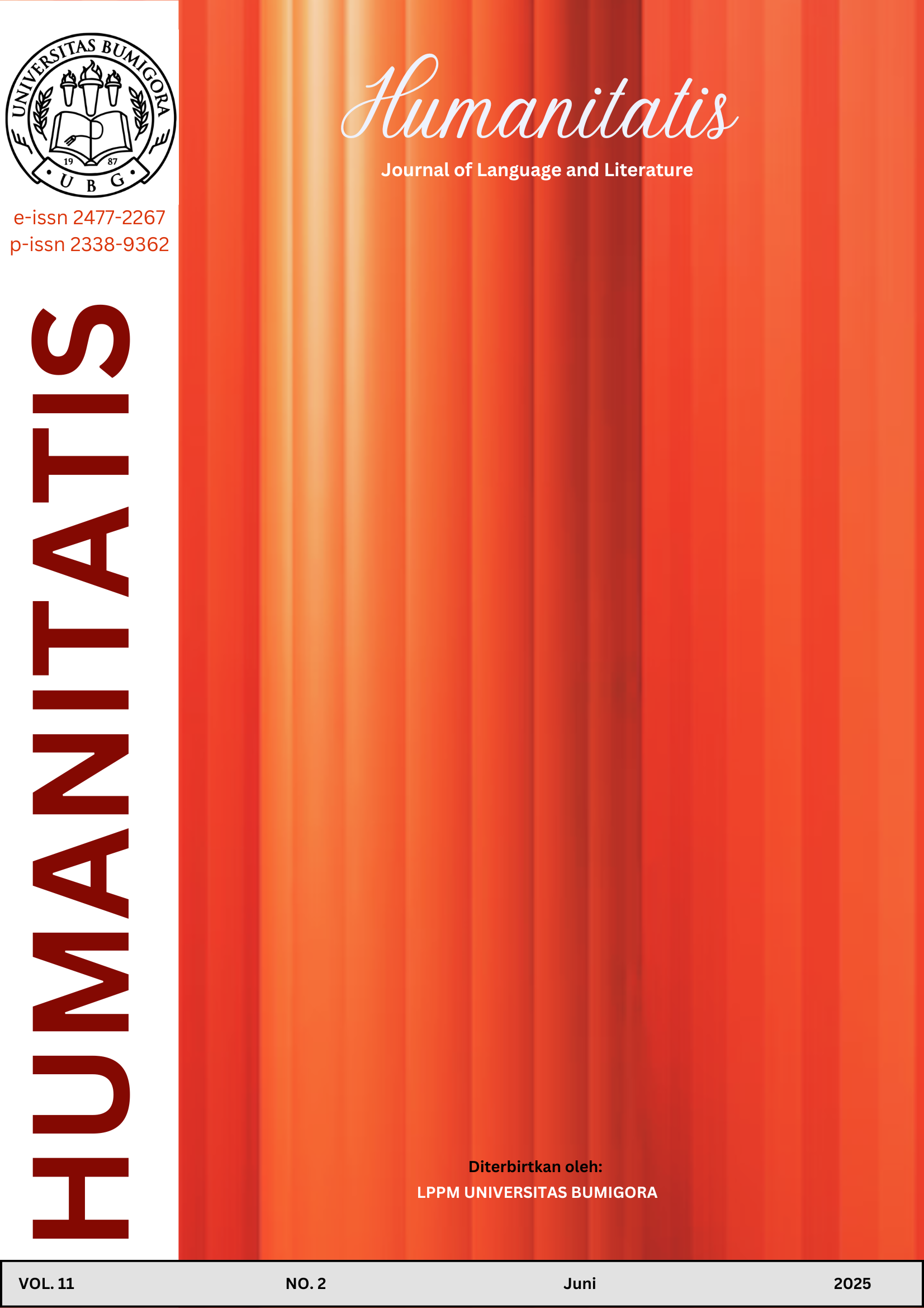Sexual Harassment in the Name of Religion and Heaven as Shown in Walid’s Film: Symbolic and Feminist Critical Approach
DOI:
https://doi.org/10.30812/humanitatis.v11i2.5108Keywords:
Religion, Sexual Harassment, Symbolic and Feminist, Walid’s FilmAbstract
This paper examines the phenomenon of sexual harassment cloaked in religious legitimacy through an analysis of the film Walid (2025), a cinematic work that critiques the abuse of religious authority. The background of cases of sexual violence in Lombok, especially in Islamic boarding schools and educational institutions, shows the existence of unequal power relations and a culture of silence that worsens the situation of victims. Walid’s film depicts charismatic religious leaders who manipulate sacred teachings to establish absolute power and commit symbolic and sexual violence. The main objectives of this study are to: (a) identify the forms of sexual harassment that are justified in the name of religion, (b) analyze the representation of religious power in films as social criticism, and (c) provide social reflections to encourage the reform of the protection system in the religious environment. This research employs a descriptive qualitative method, analyzing the theories of Power and Symbolic Relations (Michel Foucault), Symbolic Violence (Pierre Bourdieu), and Feminist Critical Theology. The findings of the study show that Walid is not only a fictional representation, but also a reflective means that expose the oppressive power structures in religious institutions, as well as invite the public to build critical awareness, fight for justice for victims, and reject all forms of violence that take refuge behind religious symbols.
References
Alexander, J. C. (2019). What makes a social crisis?: The societalization of social problems. John Wiley & Sons.
Boge, A. (2025). Pesan dakwah dalam film Lafran perspektif analisis semiotika [Unpublished manuscript].
Bourdieu, P. (2020). Outline of a theory of practice. In The new social theory reader (pp. 80-86). Routledge.
Bourdieu, P. (2024). The historical genesis of a pure aesthetic. In Anthropology of the arts (pp. 121-124). Routledge.
Branson, J., & Miller, D. (2020). Pierre Bourdieu. In Social theory (pp. 37-45). Routledge.
Demirel Ucan, A., & Wright, A. (2019). Improving the pedagogy of Islamic religious education through an application of critical religious education, variation theory and the learning study model. British Journal of Religious Education, 41(2), 202-217. https://doi.org/10.1080/01416200.2017.1383873
Fidhayanti, D., Muhammad, M., Rofiq, M. A., Fuadi, M. R., Hakim, A., & Makkiy, N. C. B. (2024). Rethinking Islamic feminist thought on reinterpreting the Qur'an: An analysis of the thoughts of Aminah Wadud, Fatima Mernissi, Asma Barlas, and Riffat Hassan. Tribakti: Jurnal Pemikiran Keislaman, 35(1), 37-56.
Foucault, M. (2019). *Power: The essential works of Michel Foucault 1954-1984*. Penguin UK.
Fowler, B. (2020). Pierre Bourdieu on social transformation, with particular reference to political and symbolic revolutions. Theory and Society, 49(3), 439-463. https://doi.org/10.1007/s11186-020-09385-2
Freathy, R., & John, H. C. (2019). Religious education, big ideas and the study of religion(s) and worldview(s). British Journal of Religious Education, 41(1), 27-40. https://doi.org/10.1080/01416200.2018.1500351
Gardner, F. (2021). Sex, power, control: Responding to abuse in the institutional church. Canterbury Press.
Hamilton, M. A. (2021). Religious practices that have contributed to a culture of secrecy regarding child sex abuse in five religious organizations. In The SAGE handbook of domestic violence (pp. 627-646). SAGE.
Harrison, R. L., Reilly, T. M., & Creswell, J. W. (2020). Methodological rigor in mixed methods: An application in management studies. Journal of Mixed Methods Research, 14(4), 473-495. https://doi.org/10.1177/1558689819882678
Hasan, M. F., & Sa'idah, Z. (2025). Representasi kekerasan seksual terhadap perempuan dalam film Vina: Sebelum 7 Hari. Nivedana: Jurnal Komunikasi dan Bahasa, 6(1), 25-42.
Islamic, G., Ishaq, M., & Dayati, U. (2024). Character education through philosophical values in traditional Islamic boarding schools. Kasetsart Journal of Social Sciences, 45(1), 31-42.
Jamaludin, A. (2025). Institutional approach: Legal protection efforts against sexual violence in Islamic boarding school educational institutions. Khazanah Hukum, 7(1), 1-16. https://doi.org/10.15575/kh.v7i1.34254
Kartika, B. A., Prihatini, N. S., Hastanto, S., & Dharsono, D. (2020). Soegija biopic film, political affirmation, and political identity: Deconstruction of Indonesian historiography. Capture: Jurnal Seni Media Rekam, 12(1), 28-47.
Khamdan, M., & Hum, M. A. (2022). Politik identitas dan perebutan hegemoni kuasa: Kontestasi dalam politik elektoral di Indonesia. A-Empat Puri Kartika Banjarsari.
Khoo, G. S., & Ash, E. (2021). Moved to justice: The effects of socially conscious films on social justice concerns. Mass Communication and Society, 24(1), 106-129. https://doi.org/10.1080/15205436.2020.1828966
Kleinig, J. (2020). Trust and critical thinking. In Trust and schooling (pp. 15-25). Routledge.
Kütük-Kuriş, M. (2021). Moral ambivalence, religious doubt and non-belief among ex-hijabi women in Turkey. Religions, 12(1), 33. https://doi.org/10.3390/rel12010033
Lizardy-Hajbi, K. (2024). Unraveling religious leadership: Power, authority, and decoloniality. Fortress Press.
Murphy, K. (2021). Scrutiny, legal socialization, and defiance: Understanding how procedural justice and bounded authority concerns shape Muslims' defiance toward police. Journal of Social Issues, 77(2), 392-413. https://doi.org/10.1111/josi.12424
Njoku, U. C. (2022). Critical reflection on child protection policies dealing with clerical sexual abuse of children within the Roman Catholic Church in Nigeria: Pastoral and missiological implications. *HTS Teologiese Studies/Theological Studies, 78*(1), 1-9. https://doi.org/10.4102/hts.v78i1.7225
Permatasari, M. S., & Amalia, D. (2022). Penyintas kekerasan seksual dalam film Penyalin Cahaya. Jurnal Komunikasi Universitas Garut: Hasil Pemikiran dan Penelitian, 8(2), 925-944.
Prastini, E. (2024). Kekerasan terhadap anak dan upaya perlindungan anak di Indonesia. Jurnal Citizenship Virtues, 4(2), 760-770.
Downloads
Published
Issue
Section
License
Copyright (c) 2025 Syamsurrijal, Muhamad Khalid Iswadi, Fitri Arniati

This work is licensed under a Creative Commons Attribution 4.0 International License.
















